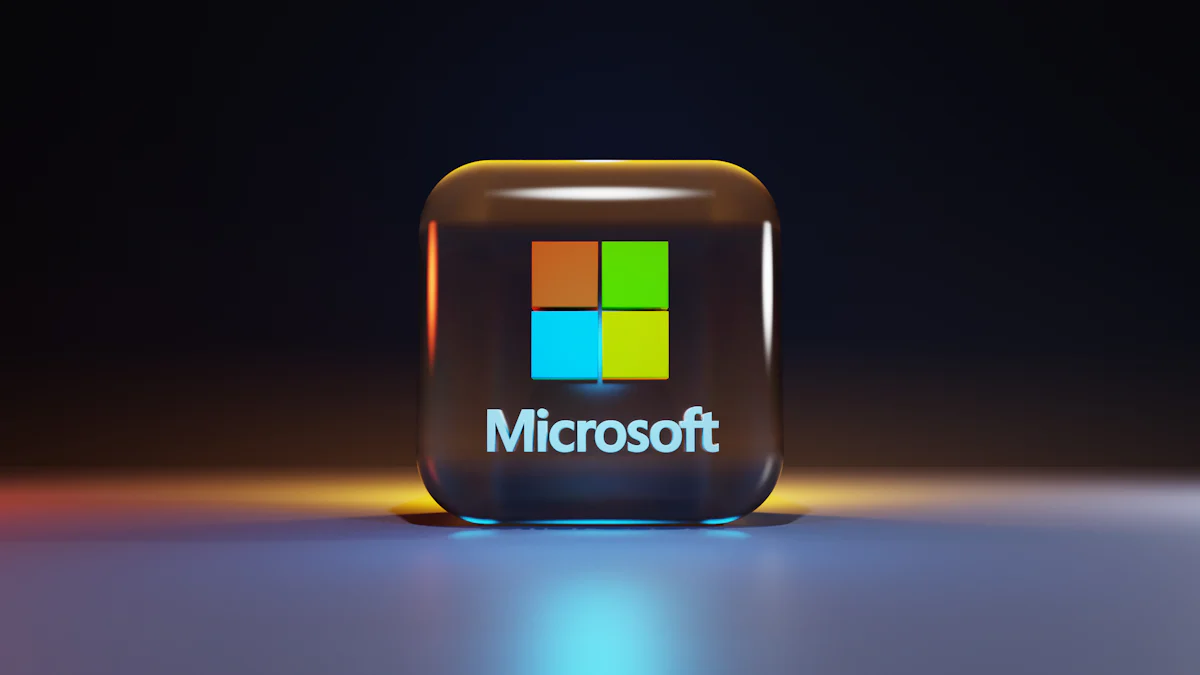

Microsoft Supply Chain Platform
Sean, Industry Editor
Oct 08, 2024

Supply chain management plays a crucial role in ensuring that products reach you efficiently and on time. It involves coordinating various processes, from sourcing raw materials to delivering finished goods. The Microsoft Supply Chain Platform emerges as a transformative tool in this domain. By integrating advanced technologies, it enhances supply chain agility and security. Efficient supply chains reduce costs by 15% and improve service levels by 65%. With innovations like AI, the platform helps businesses anticipate disruptions and optimize operations, making it indispensable in today's dynamic market.
Overview of Microsoft Supply Chain Platform
Definition and Purpose of Microsoft Supply Chain Platform
The Microsoft Supply Chain Platform serves as a comprehensive solution designed to streamline and enhance supply chain operations. It integrates various tools and technologies to address the diverse needs of businesses. By leveraging platforms like Azure, Dynamics 365, Microsoft Teams, and Power Platform, it provides a robust foundation for developing or adopting capabilities tailored to specific supply chain requirements.
Core Objectives
The platform aims to achieve several core objectives:
-
Enhance Agility: It helps businesses respond swiftly to market changes and disruptions.
-
Improve Efficiency: By optimizing processes, it reduces operational costs and increases productivity.
-
Ensure Security: The platform incorporates advanced security measures to protect supply chain data from cyber threats.
-
Promote Sustainability: It encourages sustainable practices by optimizing resource use and reducing waste.
Target Audience
The Microsoft Supply Chain Platform targets a wide range of users:
-
Manufacturers: It assists in managing production schedules and inventory levels.
-
Wholesalers: The platform supports efficient distribution and logistics management.
-
Retailers: It enhances demand forecasting and customer order fulfillment.
Historical Context of Microsoft Supply Chain Platform
Understanding the historical context of the Microsoft Supply Chain Platform provides insight into its evolution and significance in the industry.
Evolution of Supply Chain Solutions
Supply chain solutions have evolved significantly over the years. Initially, businesses relied on manual processes and basic software tools. As technology advanced, integrated platforms emerged, offering more sophisticated capabilities. These platforms now enable businesses to manage and optimize their supply chain activities efficiently.
Microsoft's Role in the Industry
Microsoft has played a pivotal role in shaping modern supply chain solutions. With its suite of products, including Dynamics 365 Intelligent Order Management, Microsoft has provided flexible and open platforms that capture orders from any source. This adaptability has made Microsoft a leader in the industry, offering solutions that cater to the complex needs of today's supply chains.
Key Features of the Microsoft Supply Chain Platform

Integration Capabilities
The Microsoft Supply Chain Platform excels in its integration capabilities, ensuring that your supply chain operations run smoothly and efficiently.
Seamless Data Flow
You benefit from seamless data flow across various systems. This feature allows you to access real-time information, which is crucial for making informed decisions. The platform's real-time data analytics provide actionable insights, enhancing your decision-making capabilities. By integrating data from different sources, you can monitor inventory levels, track shipments, and manage orders with ease.
Compatibility with Existing Systems
Compatibility with existing systems is another significant advantage. You don't need to overhaul your current infrastructure to adopt the platform. Instead, it works alongside your existing tools, enhancing their functionality. This compatibility ensures a smooth transition and minimizes disruptions in your operations. You can continue using your preferred systems while enjoying the added benefits of the platform.
Advanced Analytics
Advanced analytics play a pivotal role in the Microsoft Supply Chain Platform, offering you a competitive edge in managing your supply chain.
Predictive Insights
With predictive insights, you can anticipate potential challenges before they arise. AI-powered software optimizes forecasts for different channels, products, and customers. This capability helps you plan more effectively, reducing the risk of stockouts or overstocking. By understanding future trends, you can adjust your strategies to meet demand efficiently.
Real-time Monitoring
Real-time monitoring keeps you informed about every aspect of your supply chain. IoT devices consistently transmit data, offering insights into inventory levels, asset performance, and environmental conditions of the warehouse. This constant flow of information allows you to respond quickly to any issues, ensuring that your operations remain uninterrupted. You gain a comprehensive view of your supply chain, enabling you to make timely adjustments and maintain optimal performance.
Modules of Microsoft Supply Chain Platform
Inventory Management
Efficient inventory management is crucial for any business. The Microsoft Supply Chain Platform offers advanced tools to help you maintain optimal stock levels and meet customer demands effectively.
Automated Stock Control
Automated stock control ensures that you always have the right amount of inventory. By using real-time omnichannel data, the platform intelligently orchestrates fulfillment. This automation reduces manual errors and saves time. You can focus on strategic decisions while the system handles routine tasks.
Demand Forecasting
Demand forecasting leverages AI and machine learning to predict future needs. By analyzing patterns and trends, the platform provides insights into potential supply constraints. You can plan better and avoid shortages or excess stock. This proactive approach helps you stay ahead in the market.
Supplier Collaboration
Strong supplier relationships are vital for a smooth supply chain. The Microsoft Supply Chain Platform enhances collaboration with your partners, ensuring seamless communication and efficient management.
Communication Tools
Effective communication tools keep you connected with suppliers. The platform offers integrated solutions that facilitate real-time interactions. You can share updates, negotiate terms, and resolve issues quickly. This transparency builds trust and strengthens partnerships.
Partnership Management
Partnership management involves maintaining and nurturing supplier relationships. The platform aggregates vendor data and alerts you about important updates. By managing qualifications and assessments, you ensure compliance and quality. This comprehensive approach supports long-term collaboration and mutual growth.
Benefits of Using the Microsoft Supply Chain Platform
Efficiency Improvements
Reduced Operational Costs
You can significantly reduce operational costs by using the Microsoft Supply Chain Platform. The platform automates routine tasks like order processing and shipment tracking, which minimizes errors and speeds up operations. This efficiency leads to lower expenses. By optimizing inventory management with advanced algorithms, you accurately forecast demand, reducing holding costs and minimizing stockouts. Compared to traditional methods, these improvements make your supply chain 67% more efficient.
Streamlined Processes
Streamlining processes becomes effortless with the platform. It enhances visibility and coordination across your supply chain, ensuring smooth operations. Automation plays a key role here, allowing you to focus on strategic decisions while the system handles repetitive tasks. This streamlined approach not only saves time but also boosts productivity, giving you a competitive edge.
Enhanced Collaboration
Cross-Departmental Synergy
The platform fosters cross-departmental synergy by integrating various tools and technologies. You can easily share information and collaborate with different teams, leading to better decision-making. This synergy ensures that everyone is aligned with the company's goals, enhancing overall performance. Improved communication reduces misunderstandings and accelerates project timelines.
Supplier and Partner Engagement
Engaging with suppliers and partners becomes more effective through the platform's robust communication tools. Real-time interactions allow you to share updates and resolve issues quickly. This transparency builds trust and strengthens relationships. By managing partnerships efficiently, you ensure compliance and quality, supporting long-term collaboration and mutual growth.
Importance of Sustainability in Microsoft Supply Chain Platform

Sustainability plays a crucial role in modern supply chain management. It not only reduces environmental impact but also enhances brand reputation and drives long-term growth. By focusing on sustainable practices, you can align your operations with the values of a circular economy, which emphasizes interconnected and interdependent networks.
Environmental Impact
Resource Optimization
Resource optimization is a key component of sustainability. By using resources efficiently, you minimize waste and reduce costs. This approach supports a circular economy, where materials are reused and recycled, closing material loops. You can achieve greater efficiency by implementing strategies that optimize resource use, such as energy-efficient technologies and sustainable sourcing practices.
Waste Reduction
Reducing waste is essential for a sustainable supply chain. By minimizing waste, you decrease your environmental footprint and contribute to a healthier planet. Implementing waste reduction strategies, such as recycling programs and waste-to-energy initiatives, helps you manage resources more effectively. These practices not only benefit the environment but also improve your bottom line by reducing disposal costs.
Social Responsibility
Ethical Sourcing
Ethical sourcing ensures that your supply chain operates responsibly. By prioritizing ethical practices, you support fair labor conditions and promote human rights. Collaborating with suppliers to enhance sustainability practices is essential for stakeholder engagement. This collaboration ensures that all parties are informed and committed to ethical standards, strengthening your brand's reputation.
Community Engagement
Community engagement involves building strong relationships with local communities. By engaging with communities, you create positive social impacts and foster goodwill. Supporting community initiatives, such as education and health programs, demonstrates your commitment to social responsibility. These efforts not only benefit the community but also enhance your brand image and customer loyalty.
Innovation and Future Prospects of Microsoft Supply Chain Platform
Emerging Technologies
AI and Machine Learning
AI and machine learning are transforming supply chain management. You can leverage these technologies to gain real-time data insights, enhancing decision-making and operational efficiency. AI improves demand forecasting accuracy and provides insights into potential disruptions. This capability allows you to plan effectively and respond swiftly to changes.
IoT Integration
IoT integration plays a crucial role in modern supply chains. IoT devices collect real-time data, which AI algorithms analyze to facilitate prompt decision-making. This combination results in more agile and responsive systems. You can monitor inventory levels, track shipments, and ensure optimal warehouse conditions, leading to improved efficiency.
Future Developments
Roadmap for Growth
The future of the Microsoft Supply Chain Platform looks promising. You can expect continuous advancements in AI and IoT technologies, further enhancing supply chain capabilities. The platform aims to integrate more innovative tools, providing you with even greater flexibility and efficiency. This growth will help you stay competitive in a dynamic market.
Potential Challenges
While the future holds exciting prospects, challenges remain. You may face issues related to data security and integration with existing systems. Addressing these challenges requires careful planning and investment in robust security measures. By staying informed and proactive, you can overcome these obstacles and fully harness the platform's potential.
Case Studies and Success Stories of Microsoft Supply Chain Platform
Industry Examples
Retail Sector
In the retail sector, companies have successfully implemented the Microsoft Supply Chain Platform to enhance their operations. By integrating AI and IoT technologies, retailers have achieved remarkable improvements in inventory management and logistics. For instance, early adopters have reported a 15% reduction in logistics costs and a 35% improvement in inventory levels. These advancements have not only optimized space utilization but also facilitated forward planning, allowing retailers to meet customer demands more efficiently.
Manufacturing Sector
Manufacturers have also reaped significant benefits from the Microsoft Supply Chain Platform. By leveraging automation and AI, they have revolutionized their supply chain management processes. This transformation has led to enhanced operational efficiency, accuracy, and cost savings. A notable example is Nestle, which utilized AI to decrease energy and water consumption while improving transportation efficiency. These improvements have resulted in a more sustainable and cost-effective supply chain, setting a benchmark for other manufacturers to follow.
Lessons Learned
Best Practices
From these case studies, several best practices emerge. First, integrating AI and IoT into supply chain operations can significantly enhance efficiency and visibility. Companies should focus on optimizing inventory management and logistics to achieve cost savings and improved service levels. Additionally, fostering strong partnerships with suppliers and stakeholders is crucial for successful implementation. By maintaining open communication and collaboration, businesses can ensure smooth operations and mutual growth.
Common Pitfalls
Despite the successes, some common pitfalls must be avoided. One major challenge is the integration of new technologies with existing systems. Companies should carefully plan and invest in robust security measures to protect their supply chain data. Another potential pitfall is the lack of strategic decision-making. Businesses must leverage the insights provided by AI and IoT to make informed decisions and anticipate potential disruptions. By addressing these challenges proactively, companies can fully harness the potential of the Microsoft Supply Chain Platform and achieve long-term success.
How to Get Started with Microsoft Supply Chain Platform
Embarking on your journey with the Microsoft Supply Chain Platform involves several key steps. By following these steps, you can ensure a smooth and effective implementation that aligns with your business needs.
Implementation Steps
Initial Assessment
Begin by conducting an initial assessment of your current supply chain processes. Identify areas where inefficiencies exist and determine how the platform can address these challenges. This evaluation helps you understand the specific capabilities you need from the platform. Consider factors such as inventory management, order processing, and supplier collaboration. By pinpointing these needs, you can tailor the platform to enhance your operations effectively.
Customization Options
Once you complete the assessment, explore the customization options available within the platform. The Microsoft Supply Chain Platform offers flexibility to adapt to your unique requirements. You can integrate prebuilt connectors for order intake, delivery, and third-party logistics services. This adaptability ensures that the platform aligns with your existing systems and processes. By customizing the platform, you can optimize its functionality to meet your specific supply chain demands.
Support and Resources
To maximize the benefits of the Microsoft Supply Chain Platform, take advantage of the support and resources available to you.
Training Programs
Participate in training programs designed to help you and your team become proficient in using the platform. These programs provide valuable insights into the platform's features and functionalities. By gaining a thorough understanding, you can leverage the platform's capabilities to improve your supply chain operations. Training ensures that your team can effectively utilize the platform, leading to enhanced productivity and efficiency.
Customer Support
Access customer support services to address any questions or issues that may arise during implementation. The support team offers guidance and assistance to ensure a seamless transition. Whether you need help with technical aspects or require advice on best practices, customer support is there to assist you. By utilizing these resources, you can overcome challenges and fully harness the potential of the Microsoft Supply Chain Platform.
The Microsoft Supply Chain Platform stands as a pivotal tool in modern supply chain management. By leveraging real-time data analytics, you can enhance operational efficiency and make informed decisions. This platform empowers you to gain deeper insights into your supply chain, helping you minimize carbon impact and optimize resource use. As you explore its capabilities, consider how it can transform your business operations. Embrace this innovative solution to stay competitive and meet the demands of today's dynamic market. Take the step towards adopting this platform and unlock new opportunities for growth and sustainability.
FAQ
The Microsoft Supply Chain Platform is a comprehensive solution designed to streamline and enhance supply chain operations. It integrates advanced technologies like AI and IoT to improve efficiency, agility, and security in supply chain management.
By automating routine tasks and providing real-time data insights, the platform reduces operational costs and enhances productivity. You can optimize inventory management and streamline processes, leading to significant efficiency improvements.
Yes, the platform offers compatibility with existing systems. You can seamlessly integrate it with your current tools, ensuring a smooth transition without the need for a complete overhaul of your infrastructure.
The platform offers numerous benefits, including enhanced collaboration, improved demand forecasting, and reduced operational costs. It also supports sustainability initiatives by optimizing resource use and reducing waste.
By improving supply chain efficiency and reliability, the platform ensures timely delivery of products, which enhances customer satisfaction. As
noted, the platform has significantly boosted customer satisfaction levels.
The Microsoft Supply Chain Platform caters to a wide range of industries, including manufacturing, retail, and wholesale. Its flexible design allows you to tailor its capabilities to meet your specific business needs.
Users have access to training programs and customer support services. These resources help you and your team become proficient in using the platform, ensuring a successful implementation and ongoing support.
Continue Reading About Microsoft Supply Chain Platform
10 Must-Have Marketing Agency Reporting Tools for Your Success
Optimize your agency's performance with top reporting tools. Explore analytics, social media, SEO, and more for data-driven decisions and efficiency.
Lewis
Oct 09, 2024
Essential Guide to Supplier Data Management Best Practices
Master supplier data management with best practices to enhance relationships, boost efficiency, and secure data using advanced tools like FineDataLink.
Howard
Nov 04, 2024
2025 Data Pipeline Examples: Learn & Master with Ease!
Unlock 2025’s Data Pipeline Examples! Discover how they automate data flow, boost quality, and deliver real-time insights for smarter business decisions.
Howard
Feb 24, 2025
Best Data Integration Vendors for Seamless Workflows
Discover the top 20 data integration vendors of 2025 for seamless workflows. Compare tools like Talend, AWS Glue, and Fivetran to optimize your data processes.
Howard
Jan 22, 2025
15 Best Software Reporting Tools for 2025
Explore the top 15 software reporting tools for 2025. Compare features, pricing, and usability to find the best fit for your business needs.
Lewis
Oct 08, 2024
Business Data Analyst vs Business Analyst Key Differences Explained
Compare business data analyst vs business analyst roles, focusing on key differences, responsibilities, skills, and career paths to guide your career choice.
Lewis
Mar 11, 2025


